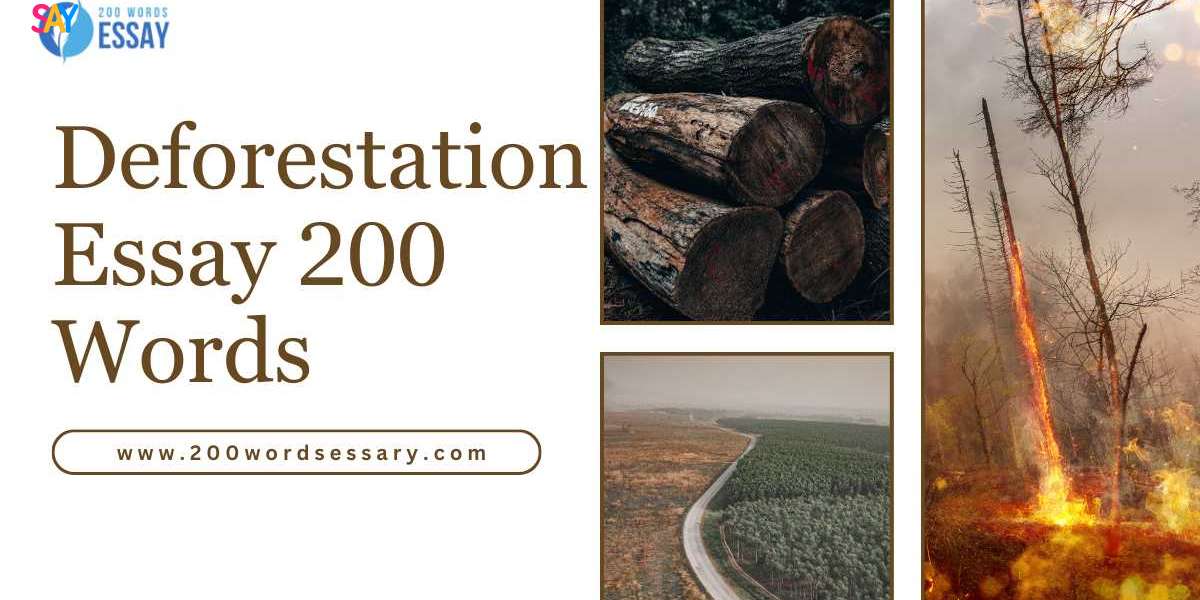Deforestation, a looming global environmental crisis, disrupts our planet's delicate ecosystems. This exhaustive blog plunges into the intricate facets of deforestation, unraveling its definition, scrutinizing its causes, presenting three succinct examples of 200-word essays, dissecting negative environmental impacts, offering invaluable writing tips, and culminating with a resounding call to action. This profound journey navigates the heart of the issue with precision.
What is Deforestation:
At its core, deforestation entails the large-scale removal of trees, a process that intricately disrupts ecosystems and unleashes far-reaching consequences. Human activities stand as the primary culprits behind this pervasive environmental challenge.
Causes of Deforestation:
The causes, diverse and human-centric, span from logging for timber, agricultural expansion, infrastructure development, mining activities, intentional fires, climate change, to livestock grazing and illegal logging. The interconnectedness of these factors contributes to the alarming global rates of deforestation.
Urbanization and Infrastructure Expansion: Rapid urbanization and the expansion of infrastructure projects exert relentless pressure on forests as they are cleared to accommodate the burgeoning global population and urban development.
Shift in Land Use for Bioenergy Production: The increasing demand for bioenergy sources like biofuels leads to the conversion of forests into plantations for crops such as palm oil and sugarcane, altering land use and contributing to deforestation.
Global Demand for Agricultural Commodities: The insatiable global demand for agricultural commodities fuels large-scale agricultural expansion, prompting the clearing of forests to make way for commercial farming, particularly in resource-rich regions.
Infrastructure Development for Extractive Industries: The exploration and extraction of natural resources necessitate infrastructure development, such as roads and pipelines, opening untouched forested areas to resource extraction and contributing to deforestation.
Population Growth and Subsistence Agriculture: In many developing regions, population growth and the need for subsistence agriculture drive local communities to clear land for farming, collectively contributing to significant deforestation.
Examples of Deforestation Essays (200 Words Each):
Here are three examples of deforestation essays, each within 200 words:
- "The Silent Impact: Deforestation's Ripple Effect on Global Climate"
Deforestation, though appearing as a distant act, resonates globally with a silent yet impactful echo. As trees fall, a chain reaction ensues, intensifying the greenhouse effect and contributing significantly to climate change. The removal of trees disrupts the delicate balance of the carbon cycle, leading to increased greenhouse gas levels. This not only warms the planet but also triggers irregularities in weather patterns, resulting in more frequent and severe extreme weather events.
Furthermore, the intricate connection between forests and the water cycle is severed during deforestation. Changes in rainfall patterns become apparent, and the risk of both droughts and floods amplifies. The consequences are far-reaching, affecting not only the environment but also communities reliant on stable climate conditions. To address this silent impact, a global awareness and collaborative efforts are imperative. Preserving our vital forests emerges as a crucial step towards mitigating climate change and ensuring the resilience of our planet.
- "Socioeconomic Ramifications: Dissecting the Human Side of Deforestation"
Deforestation extends its reach beyond environmental consequences, delving into the intricate tapestry of human societies. This essay uncovers the socioeconomic ramifications, emphasizing the deep connections between forest ecosystems and human well-being. As trees vanish, livelihoods intertwined with forest resources face disruption, impacting communities worldwide.
Indigenous populations, intimately connected to the forest, bear the brunt of displacement, loss of cultural heritage, and economic hardships. The timber industry, while a source of income, often perpetuates unsustainable practices, exacerbating social inequalities. Deforestation accompanying agricultural expansion alters land-use patterns, displacing small-scale farmers and impacting marginalized communities disproportionately.
Addressing deforestation requires policies that transcend environmental concerns, integrating social dimensions. Sustainable forestry practices, community engagement, and alternative livelihood opportunities are pivotal in mitigating the human consequences of deforestation, fostering a harmonious coexistence between communities and their natural surroundings.
Also Read: Unique Ideas Examples of Deforestation Essay 200 Words
- "Nature's Symphony Disrupted: Biodiversity Loss in the Wake of Deforestation"
The relentless march of deforestation disrupts the intricate harmony of Earth's biodiversity, unleashing a cacophony of consequences. As trees fall, habitats crumble, leaving countless species without their homes. This essay unveils the profound impact of deforestation on biodiversity, where the removal of forests becomes a dissonant note in the symphony of life.
Habitats are razed, leading to the loss of diverse plant and animal species. The fragmentation of ecosystems isolates species, disrupting migration patterns and increasing the risk of extinction. Beyond the direct impact on species, deforestation erodes genetic diversity, diminishing the resilience of ecosystems to environmental changes.
Indigenous communities, deeply intertwined with the forest, witness the loss of not only biodiversity but also traditional knowledge, severing age-old connections between humans and nature. Urgent conservation efforts are imperative to defend biodiversity, requiring a global commitment to sustainable practices and conservation initiatives. In the face of deforestation, the restoration of nature's symphony demands a collective dedication to preserving Earth's biodiversity.
Negative Effects on the Environment:
Five negative effects of deforestation on the environment include the loss of biodiversity, climate change impact, disruption of water cycles, soil erosion and degradation, and increased vulnerability to natural disasters.
Tips to Write the Essay:
Research thoroughly, structure your essay logically, provide evidence with real-world examples, prioritize conciseness, and ensure clarity in defining deforestation and its multifaceted consequences.
Conclusion:
In conclusion, addressing deforestation demands a holistic understanding, sustainable practices, anti-deforestation measures, and global collaboration. This comprehensive exploration serves as a vital resource for readers to grasp, reflect, and act collectively for a sustainable future.




